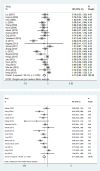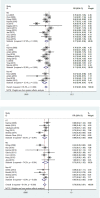CD133 expression may be useful as a prognostic indicator in colorectal cancer, a tool for optimizing therapy and supportive evidence for the cancer stem cell hypothesis: a meta-analysis
- PMID: 26840260
- PMCID: PMC4891101
- DOI: 10.18632/oncotarget.7054
CD133 expression may be useful as a prognostic indicator in colorectal cancer, a tool for optimizing therapy and supportive evidence for the cancer stem cell hypothesis: a meta-analysis
Abstract
We performed a meta-analysis of CD133-related clinical data to investigate the role of cancer stem cells (CSCs) in the clinical outcomes of colorectal cancer (CRC) patients, analyzing the effectiveness of various therapeutic strategies and examining the validity of the CSC hypothesis. For 28 studies (4546 patients), the relative risk (RR) to survival outcomes associated with CD133+ CRCs were calculated using STATA 12.0 software. Pooled results showed that CD133High patients had poor 5-year overall survival (RR 0.713, 95% CI 0·616-0·826) and 5-year disease free survival (RR 0·707, 95% CI 0·602-0·831). Both associations were consistently observed across different races, research techniques and therapeutic strategies. In a subgroup receiving adjuvant therapy, CD133Low patients achieved significantly better survival than CD133High patients. The findings suggest that CD133 could serve as a predictive marker of poor prognosis and treatment failure in CRC. CD133Low patients could benefit from adjuvant treatments, while CD133High patients should be given novel treatments besides adjuvant therapy. Our results also provide evidence in support of the CSC hypothesis.
Keywords: CD133; cancer stem cell; meta-analysis; tumor genesis; tumor recurrence.
Conflict of interest statement
All authors declared that they had no conflicts of interests.
Figures




Similar articles
-
LGR5 and CD133 as prognostic and predictive markers for fluoropyrimidine-based adjuvant chemotherapy in colorectal cancer.Acta Oncol. 2016 Dec;55(12):1425-1433. doi: 10.1080/0284186X.2016.1201215. Epub 2016 Jul 20. Acta Oncol. 2016. PMID: 27435662 Clinical Trial.
-
Increased expression of CD133 is a strong predictor of poor outcome in stage I colorectal cancer patients.Scand J Gastroenterol. 2012 Oct;47(10):1211-7. doi: 10.3109/00365521.2012.694904. Epub 2012 Aug 3. Scand J Gastroenterol. 2012. PMID: 22856425
-
High expression of octamer-binding transcription factor 4A, prominin-1 and aldehyde dehydrogenase strongly indicates involvement in the initiation of lung adenocarcinoma resulting in shorter disease-free intervals.Eur J Cardiothorac Surg. 2012 Jun;41(6):e173-81. doi: 10.1093/ejcts/ezs170. Epub 2012 Apr 23. Eur J Cardiothorac Surg. 2012. PMID: 22529186
-
The most reliable surface marker for the identification of colorectal cancer stem-like cells: A systematic review and meta-analysis.J Cell Physiol. 2019 Jun;234(6):8192-8202. doi: 10.1002/jcp.27619. Epub 2018 Oct 14. J Cell Physiol. 2019. PMID: 30317669
-
CD133 expression correlates with clinicopathologic features and poor prognosis of colorectal cancer patients: An updated meta-analysis of 37 studies.Medicine (Baltimore). 2018 Jun;97(23):e10446. doi: 10.1097/MD.0000000000010446. Medicine (Baltimore). 2018. PMID: 29879012 Free PMC article. Review.
Cited by
-
CD133 expression predicts post-operative recurrence in patients with colon cancer with peritoneal metastasis.Int J Oncol. 2018 Mar;52(3):721-732. doi: 10.3892/ijo.2018.4240. Epub 2018 Jan 8. Int J Oncol. 2018. PMID: 29328371 Free PMC article.
-
The prognostic value of CSCs biomarker CD133 in NSCLC: a meta-analysis.Oncotarget. 2016 Aug 30;7(35):56526-56539. doi: 10.18632/oncotarget.10964. Oncotarget. 2016. PMID: 27489355 Free PMC article.
-
An intestinal stem cell niche in Apc mutated neoplasia targetable by CtBP inhibition.Oncotarget. 2018 Aug 21;9(65):32408-32418. doi: 10.18632/oncotarget.25784. eCollection 2018 Aug 21. Oncotarget. 2018. PMID: 30197752 Free PMC article.
-
Prognostic significance of CD133 and ABCB5 expression in papillary thyroid carcinoma.Eur J Histochem. 2020 Nov 12;64(4):3143. doi: 10.4081/ejh.2020.3143. Eur J Histochem. 2020. PMID: 33207860 Free PMC article.
-
Distant Metastasis in Colorectal Cancer Patients-Do We Have New Predicting Clinicopathological and Molecular Biomarkers? A Comprehensive Review.Int J Mol Sci. 2020 Jul 24;21(15):5255. doi: 10.3390/ijms21155255. Int J Mol Sci. 2020. PMID: 32722130 Free PMC article.
References
-
- Reya T, Morrison SJ, Clarke MF, Weissman IL. Stem cells, cancer, and cancer stem cells. Nature. 2001;414:105–111. - PubMed
-
- Nguyen LV, Vanner R, Dirks P, Eaves CJ. Cancer stem cells: an evolving concept. Nat Rev Cancer. 2012;12:133–143. - PubMed
-
- Clarke MF, Dick JE, Dirks PB, Eaves CJ, Jamieson CH, Jones DL, Visvader J, Weissman IL, Wahl GM. Cancer stem cells—perspectives on current status and future directions: AACR Workshop on cancer stem cells. Cancer Res. 2006;66:9339–9344. - PubMed
-
- Clevers H. The cancer stem cell: premises, promises and challenges. Nat Med. 2011;17:313–319. - PubMed
Publication types
MeSH terms
Substances
LinkOut - more resources
Full Text Sources
Other Literature Sources
Medical
Research Materials

